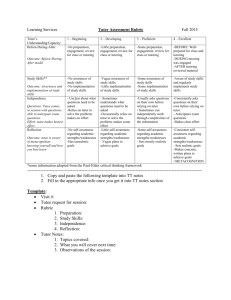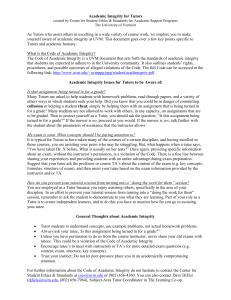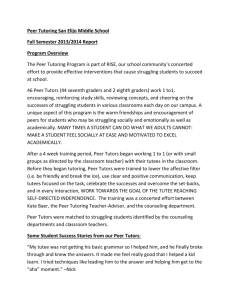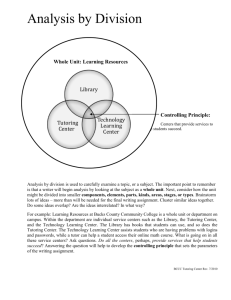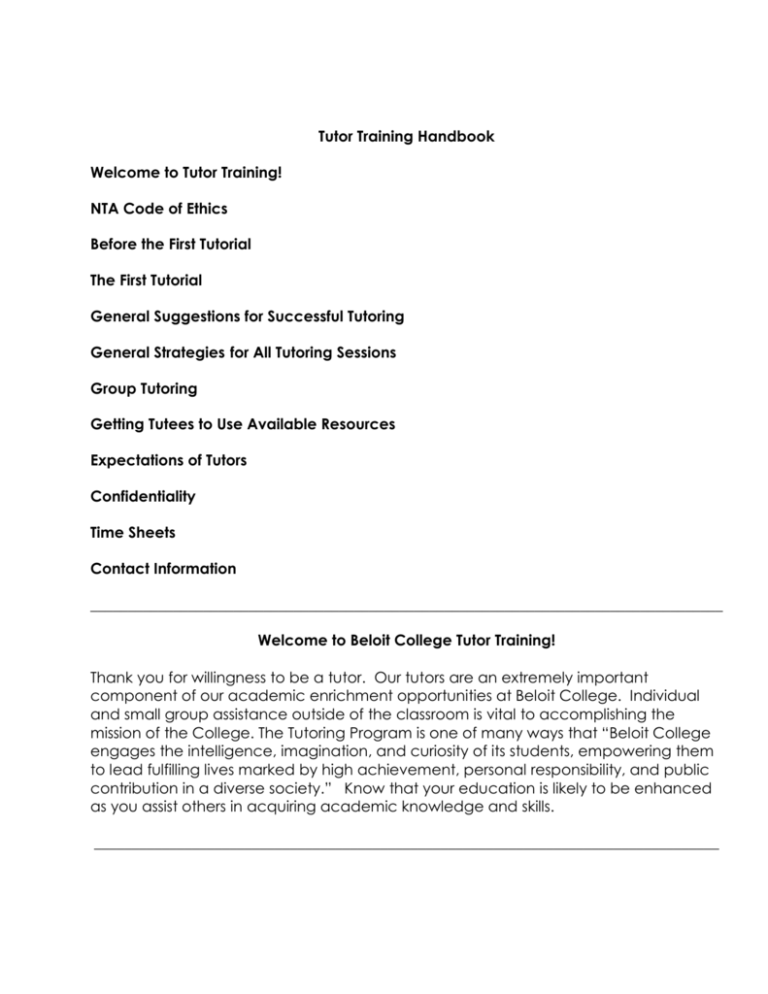
Tutor Training Handbook
Welcome to Tutor Training!
NTA Code of Ethics
Before the First Tutorial
The First Tutorial
General Suggestions for Successful Tutoring
General Strategies for All Tutoring Sessions
Group Tutoring
Getting Tutees to Use Available Resources
Expectations of Tutors
Confidentiality
Time Sheets
Contact Information
____________________________________________________________________________________
Welcome to Beloit College Tutor Training!
Thank you for willingness to be a tutor. Our tutors are an extremely important
component of our academic enrichment opportunities at Beloit College. Individual
and small group assistance outside of the classroom is vital to accomplishing the
mission of the College. The Tutoring Program is one of many ways that “Beloit College
engages the intelligence, imagination, and curiosity of its students, empowering them
to lead fulfilling lives marked by high achievement, personal responsibility, and public
contribution in a diverse society.” Know that your education is likely to be enhanced
as you assist others in acquiring academic knowledge and skills.
___________________________________________________________________________________
NTA Code of Ethics
The National Tutoring Association is dedicated to providing its members with opportunities to
achieve and maintain high professional standards for tutors and administrators of tutoring
programs and services.
I understand that my role as a tutor is to never do the student's work for him or her.
I will give honest feedback to the student I serve and will not insult my student with false
hope or empty flattery; I will always demonstrate faith in my student's learning abilities.
I understand that my relationship to the student is professional and not personal.
I will show respect for my student's cultural background and personal value system.
I recognize that I may not have all the answers to student questions. In this event, I will
seek assistance in finding answers to the student's questions and/or direct the student to
an appropriate resource for the information.
I will maintain accurate records of tutoring sessions as expected and required.
I will respect my student's personal dignity at all times.
I will be on time for tutoring appointments, not only out of courtesy, but to be a good
example for my student to follow.
I will keep all information about the student whom I am assigned confidential.
I understand that my ultimate goal is to assist my student in learning how he or she best
learns and to help my student develop the skills to achieve his or her best, most efficient
learning.
I will share any concerns I have with my supervisor.
I expect to learn along with my student.
I will keep current in both my subject area(s) and learning methodologies.
I will remain flexible to my approach to student learning, respectful of the various
learning styles.
I will share techniques for improved study skills with my students.
The National Tutoring Association Tutor Code of Ethics is copyrighted by the National Tutoring Association, all rights reserved 2003.
The National Tutoring Association Code of Ethics may be reprinted with acknowledgment to The National Tutoring Association
who owns all rights.
_________________________________________________________________________________
BEFORE THE FIRST TUTORIAL
1. Once you receive the email with your tutee’s information, try to contact the
tutee immediately.
2. If you have not made contact with your tutee within three days of receiving the
assignment, inform the office staff (and keep trying to make contact with your
tutee). You can call x: 2572 or email tutoring@beloit.edu or stop by the office.
3. Make the first tutoring session within a few days of receiving the assignment.
4. Stop by the office and pick up the appropriate forms:
Record of Tutoring or Record of Group Tutoring
Time Sheet
Tutor-Tutee First Session
Tutee Expectations/Agreement
Tutoring Session Summary Sheet (optional, but recommended)
5. Tutoring sessions are to be held for at least one hour each and no more than 2
hours in a row. Time reported is to be rounded to the nearest quarter hour.
6. Review the section titled “The First Tutorial.”
_______________________________________________________________________________
THE FIRST TUTORIAL
Your first meeting with your tutee is often crucial in establishing the atmosphere of
later tutoring sessions. Convey that you are an approachable and empathetic
person. Cover the areas described below. Bring the appropriate forms with you
(see “Before the First Tutorial”).
1. Check that you know each other’s correct name, phone numbers, email
addresses and box numbers (any changes, please report to the office).
2. Together, decide a time and place to meet regularly for tutoring. Do not agree
that the student will call you when s/he needs you. Effective tutoring rarely
takes place when arranged on this basis.
3. Get to know the tutee. Find out where s/he is from, what year s/he is at Beloit,
what clubs/activities s/he is involved in and any other area of interest to you. For
language tutoring, conduct these conversations in the language of the course,
when possible.
4. Gather information relevant to the course. Find out why the tutee took the
course and/or what academic background that the student has for the course.
5. Discuss the tutee’s general goals for the tutoring sessions.
6. Discuss the tutee’s expectations of you as a tutor and clarify your role. Ask if the
student has been tutored before, and if so, ask the student to describe the
experience (e.g. what worked, what could be improved).
7. Evaluate the student’s work in the course. Look at the student’s notes, quizzes,
essays, and/or textbook notes and/or listen to any areas of verbal expression (in
language courses) that need to be addressed.
8. If time permits during the first session, work on a specific topic so that the
student leaves the first session with a feeling of accomplishment.
9. Discuss the goal (s) for the next session. Give the tutee specific instructions on
how to prepare for the next session. You may use the Tutoring Session Summary
sheet for this purpose.
10. Remember to complete and have your tutee sign both the Record of Tutoring
and Tutee Expectations/Agreement forms.
11. Return the completed Tutee Expectations/Agreement form to the office as soon
as possible.
12. Before the next session, give some thought as to how YOU should prepare for
the next tutorial.
__________________________________________________________________________________
GENERAL SUGGESTIONS FOR SUCCESSFUL TUTORING
BUILD RAPPORT AND TRUST
Successful tutoring is based as much on rapport between tutor and tutee as the tutor’s
knowledge in the subject area.
Demonstrate respect for and confidence in the tutee.
What you do is as important as what you say.
Any information shared by the tutee is private.
Exceptions: 1) you can always talk to professional staff member about your tutee.
2) if tutee reveals that s/he is planning harm to self or someone else (call Security).
USE GOOD COMMUNICATION SKILLS
Be alert to both verbal and nonverbal cues that the student is not “getting it.”
Allow ample time (at least 10 seconds) for the tutee to respond to questions.
Ask open-ended questions.
Do not interrupt.
Listen attentively (are there underlying assumptions that are incorrect?).
Keep the tutee focused on the purpose of the tutorial.
Ask the tutee for feedback on the tutoring sessions on a regular basis.
BE ENCOURAGING
Provide encouragement and praise whenever possible.
Think of interesting and varied ways of presenting material.
Be tactful but clear in addressing a student’s mistake(s). Try to have the tutee identify
the mistake, review the material, and figure out the correct answer so that s/he can
eventually learn how to do this process on his/her own.
Patience and compassion are a must at this point.
BE AWARE OF PHYSICAL CONSIDERATIONS
Find a low distraction area for tutoring with appropriate seating and aids (such as a
black board/white board). Our office will assist you in obtaining what you need, if
possible.
Do not stand while the student is sitting. Standing while the student is sitting is a
nonverbal cue that the student has less status than you.
Maintain eye contact with the student so that you “read” his/her reaction to your
explanations/questions (allowing for cultural differences).
Make sure that your personal hygiene allows for relatively close personal contact.
ORGANIZE AND PREPARE FOR YOUR SESSION
Always come to each session prepared. (Use the course syllabus, have the tutee
email you questions/topic areas in advance).
Think of examples, problems, or practice questions.
Be familiar with assignments and test due dates. If you do not have this information, try
to obtain it from the student and/or professor of the course.
Break material into small parts. Small steps taken one at a time are usually most
effective for the student.
Begin each session with a review of the material covered in the previous session.
Students may know and understand something one day and then not be able to
recall it later; frequent review is often helpful.
ENHANCE THE STUDENT’S STUDY SKILLS
Examine the student’s strategies and skills for learning the material.
View the student’s lecture notes, textbook notes, review methods for exams and
quizzes. Provide suggestions for improvement.
Check how the student is managing time and coping with multiple demands.
Assist the student in these areas wherever you can.
If you think that the student needs additional assistance, have him/her make an
appointment with the Director of the Learning Enrichment and Disability Services office.
____________________________________________________________
GENERAL STRATEGIES FOR ALL TUTORING SESSIONS
Present the information in as many ways as possible using the suggestions
mentioned previously.
Talk with the professor of the course for suggestions (without revealing your tutee’s
name).
Develop colors, abbreviations, sounds, or gesture systems for the concepts to help
the student remember.
Combine strategies and techniques. If you find one combination of approaches is
not working, try another. Be flexible until you find something that works consistently.
Even then, do not get complacent with one approach for one student. By using
different approaches you can help the student strengthen weaknesses that might
be important for future professors, classes and/or studies.
Ask questions which give the student an opportunity to demonstrate his/her
knowledge or understanding. Make sure the student understands the value of
reading the textbook BEFORE the class period it is due, this will aid in understanding
the discussion/lectures.
Keep notes on tutoring sessions so that you remember what you covered, where
you left off, and what you are planning to cover in the following session.
Drill and practice repeatedly.
__________________________________________________________________________________
GROUP TUTORING
As many students as possible will be assigned to work in groups of two with one tutor.
Tutors need to be thoughtful about assisting students in working with each other.
Benefits of Group Tutoring
–Students learn from each other since they often have different strengths and
weaknesses and/or they hear or understand different aspects of a topic.
–Once students experience a small study group, they realize that they can form their
own study groups and don’t always need a tutor.
–The tutor has two perspectives on classroom activities.
–More students can be served with limited resources.
–Students realize that they are not the only one experiencing challenges within the
classroom.
A Group tutor will:
-Encourage tutees to become a team - providing a support to each other.
-Encourage tutees to talk to each other.
-Point out successful strategies of one tutee so that other(s) can learn from it.
-Encourage tutees to become accountable to each other.
-Model positive interactive behavior.
_________________________________________________________________________________
GETTING TUTEES TO USE AVAILABLE RESOURCES
ENCOURAGE YOUR TUTEE TO:
1) Communicate with Professors (and Advisors)
For some students, getting to know faculty is intimidating. Talk about some of your
experiences with a faculty member or go with the tutee to visit a faculty member.
2) Come to the Learning Enrichment and Disability Services (2nd floor Pearsons)
If your tutee seems to need help in an area other than the content of the class,
decide if you can be of assistance. If so, go ahead. If it seems beyond your abilities,
refer the tutee our office or another appropriate office (e.g. counseling center). The
tutee can get information from a tabling session, talk with a Learning Assistant, attend
a workshop, and/or meet with the Director.
We can usually provide assistance in the following areas: organization, time
management, taking notes in classes or from books/articles, reading comprehension,
memorization techniques, preparing for exams, math anxiety, test anxiety, motivation,
de-procrastination, goal setting, working with faculty, and presentation skills. We can
also assist students who have personal issues such as relationships (e.g. friend issues,
family problems), over involvement in extra-curricular activities, and/or managing
stress. Students can also ask about dropping courses (before or after the deadline),
incompletes, and other academic options. Students who mention that they have a
disability and don’t appear to be using accommodations should also be referred to
this office. [Please refrain from deciding that a student has a disability on your own. If
you wonder, refer the student to our office without indicating your thoughts.]
3) Come to the Dean of Students Office Area (Dean of Students, Associate Dean of
Students, Director of Advising, Director of Intercultural Affairs) (2nd floor Pearsons)
These staff can also assist students who have personal issues that are affecting their
academic performance such as relationships (e.g. friend issues, family problems), over
involvement in extra-curricular activities, and/or managing stress. Students can also
ask about dropping courses (before or after the deadline), incompletes, and other
academic options. If you are in doubt, please refer the student here – if it is not the
appropriate place, we will make sure that the student is connected to the right place.
4) Use Teaching Assistants (T.A.s) and Labs
Explain the role of the TA (if there is one) in the class. If there are TA “help” sessions for
the class, encourage the tutee to attend them in addition to tutoring sessions with you.
If your subject area has a lab (e.g. Kemper Lab for Economics, Math Lab, Language
Lab), find out what resources are available, what time it is open, and what services are
provided (T.A.s, tapes, etc.) and then encourage the tutee to use the lab.
_________________________________________________________________________________
Expectations of Tutors
Complete (with your tutee) the Tutee Expectations/Agreement (TEA) form. It is
the TUTOR’s responsibility to return it to our office as soon as possible.
Regularly meet when and where you indicated on the TEA form – notify us if this
information changes.
Take tutees on a first-come, first-serve basis as assigned by the Matching L.A.
Work in small groups when possible so that tutees can learn from each other.
Be willing to be observed during your tutoring sessions by the Tutor Training and
Observation L.A. or the Director.
When contacted by the office staff (by email or phone), you are expected to
respond in a timely manner.
Complete and turn in the appropriate forms on a timely basis.
Follow the General Suggestions for tutoring provided to you.
Remain a positive role model in all campus activities.
Tutors and tutees may be encouraged to engage in different tutoring strategies,
participate in conflict resolution efforts, or change problematic behaviors (e.g.
arriving late).
Situations that cannot be resolved through other efforts may result in the Director
reassigning the tutee to a different tutor (when available).
Tutors who frequently have tutees express concerns with their tutoring abilities
and/or practices may not be assigned on a first-come, first-serve basis. In
addition, the Director may consult with the professor who originally
recommended you to tutor.
Tutors are expected to follow the NTA Code of Ethics. This includes but is not
limited to the following: Under no circumstances are you to do the actual work
for the student. You and the tutee both risk being accused of academic
dishonesty and/or plagiarism. Any tutor found engaging in any form of
academic dishonesty (via tutoring or otherwise) will be terminated and your
recommending faculty member will be informed.
If you have any questions or concerns in this area, speak with a staff person in the
office and/or an appropriate faculty member (without revealing the tutee’s name)
before you take an action that might cause problems for you or the tutee.
__________________________________________________________________________________
CONFIDENTIALITY
Personal Information:
All information shared by the tutee is to be considered confidential. If you become
aware that your tutee has personal, medical, financial or study skills problems, please
talk with the Director about appropriate assistance, resources and/or referral. The
information will remain confidential unless the tutee appears to be an imminent threat
to him/her self or others.
If your tutee expresses to you an intent to harm him/her self or another, or appears
depressed enough to concern you, do not leave the tutee alone. If it is during regular
office hours, as soon as you can (without leaving the tutee alone), call the Counseling
Center (x: 2643) or the Dean of Students’ office (x: 2660). If it is during the evening or
weekend, call campus security (x: 2355). Security will then contact the student affairs
staff member "on call" to handle the situation from that point.
Academic confidentiality:
Contact with the faculty member of the course(s) that you are tutoring is encouraged;
just don’t reveal your tutee's name to a professor without the tutee's consent.
If the tutee gives permission for you to identify him/her to the faculty member of the
course, you must realize that it is not permission for you to discuss this tutee with
anyone else (other faculty, students, staff, etc.), except the Director of this office.
Consequences of betraying a confidence:
If it becomes apparent that you are revealing the identity of your tutees and/or discussing
any information about your tutees with others, you will be reprimanded and likely
terminated from employment as a tutor. The professor who recommended you will
also be notified.
_________________________________________________________________________________
Time Sheets:
It is important for our office to receive Time Sheets and Record of Tutoring forms as it
helps us to determine how much tutoring is actually occurring. While we appreciate
those who are willing to tutor without getting paid for it, we actually prefer that you
turn in your forms so that we have records that the tutoring is actually occurring.
Our deadline for completing the time sheet is a few days BEFORE those required by
the Payroll Office. We typically process over 100 time sheets per month before we
give them to payroll which is why it is important for you to complete the forms
completely and by the date requested.
Beloit College Student Employment Time Sheets (referred to as “Time Sheets”) (pink)
are available in our office. Complete all hours for the current month on one time
sheet (even if you have more than one tutee – all hours for that month are on the
same time sheet). Never enter hours for more than one month on one time sheet. If
you have more than one position on campus, complete separate time sheets for each
position and make sure that you do not indicate that you were working in two places
at one time. Make sure that you begin recording your hours in the correct week on the
time sheets.
To complete the Time Sheet:
Fill in your name, student ID number and month/year.
Department: Learning Enrichment and DS
Account #: Leave blank; the office will put it in
Position: Tutor
Hourly Rate: $7.40 for new tutors with no advanced training (2009 -2010)
Be sure
to Sign and Date Your Time Sheet!
you have the Record of Tutoring form(s) signed by your Tutee(s)!
you turn them in by the due date!
Again, at the time and date indicated, bring the Time Sheet AND the Record of
Tutoring forms (for each student or group you tutor) to the office IN PERSON by 4:00
p.m. Remember, completing the paperwork completely and correctly is YOUR
RESPONSIBILITY. If you have any questions or concerns regarding this process, please
contact us BEFORE the paperwork is due.
Time Sheet Due Dates for Fall 2209/Spring 2010
Due in Learning Enrichment and Disability Services Office by 4:00 p.m.
Thursday, October 1, 2009
Monday, November 2, 2009
Tuesday, December 1, 2009
Thursday, December 16, 2009
Monday, February 1, 2010
Friday, February 26, 2010 (if you are leaving for spring break) OR
Monday, March 1, 2010
Thursday, April 1, 2010
Thursday, April 29, 2010
No tutoring is to occur during Study Days or Exam Weeks. As tutors are students first,
you are to study and prepare for your own exams. In addition, one of your goals as a
tutor is to help the tutee learn how to become an independent learner, mange their
time and learn what is necessary BEFORE exam week.
__________________________________________________________________________________
Contact Information
Learning Enrichment and Disability Services
2nd floor Pearsons
(608) 363-2572
tutoring@beloit.edu

